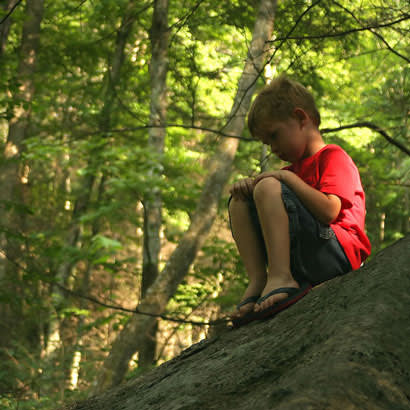
“I’m just going to go across the road and...DIE!”
So declared my then 8-year-old son, who has Asperger’s Syndrome.
What caused him such overwhelming agony that he felt he simply could not go on?
I moved a forsythia bush in the yard from there to over there.
And while the drama was undeniably amusing at the time (and required pains to hide it), it’s a great example of one of the mistakes I made — and the lessons I learned — in nurturing my son’s personal development as he grew up.
As mainstream recreational programming widens to welcome more children with special needs, and the real opportunities to raise these children’s future prospects grow, I humbly offer some of the simple strategies my wife and I learned in raising our young son, which may help in providing a more nurturing aspect to your programming.
1. Practice coping mechanisms
Kids with Asperger’s often suffer from sensory overload, detecting every sight and motion, every sound and smell, every texture and sensation. Our son was unable to tune out the background clamor most people don’t even notice. Because it’s not possible to control all surroundings, we introduced and practiced coping mechanisms that helped him manage the overload. Things like deflecting anger with humor, providing a safe place of retreat (very important!), and teaching him how to read facial expressions helped him cope when tensions ran high.
2. Pick your battles
Because he needed social interaction, but would never choose it on his own, we limited the battles on that front to just two that did him a world of good: Boy Scouts with its outdoor adventures; and marching band with its required precision appealed to his mathematical mind. Knowing what’s really important, rather than what’s merely a preference, helped us focus our care where he needed it most and avoid needless confrontations and frustrations.
3. Provide stability
Kids with Asperger’s love their ruts. That’s where they’re comfortably ensconced. They’re happy there, with no need to ever change. Routines are important. Rules are important. So as much as possible, we provided stability at home with our routines and consistency in enforcing rules.
This youngest child of four shared household chores with his siblings. Saturday was yardwork, Sunday was church. Every evening at 5:30 the whole family sat down together for supper. And after we were done eating, we lingered together to share in a variety of subjects — from listening to a piece of music to discussing current events to admiring artwork, or something from science, history or literature. One springtime we read the entire book of The Adventures of Tom Sawyer aloud in small segments after supper. Provide stability.
4. Prepare for changes
You thought you hated change? Try being a kid with Asperger’s with absolutely zero tolerance! Here was my mistake in moving the bush: I never warned him. While he was at school one day, I decided on the spur of the moment to transplant the shrub. It was already a done deal when he got home. “NNNOOOO!!” He simply could not cope with its suddenness. His life was over. The only thing he felt he could do was to go across the road and die!
We learned to prepare our son for changes that will come. One year, we had a great three-week vacation at the end of the summer. When we arrived home, we realized, “Oh, yeah, school starts next week.” What! A! Disaster! From that episode, we learned to prepare him for transitions. “Son, school starts in four weeks, three weeks, two weeks, next Tuesday…” “You’re going to have to start wearing pants again soon instead of shorts because the days are getting colder and you’ll freeze your buns off!” Prepare for change.
5. Persevere in unconditional love
No matter the depth of his meltdowns or how he acted out, our love and acceptance as a vital part of our family were never questioned. We approached it from this truth: “Son, you have an amazing gift in being able to view the world from a unique perspective — and you will find purpose in it. Hang in there. We love you intensely!” Persevere!
So for those who have or are working with young children on the autism spectrum, I offer this encouragement and hope: My son — the physicist with a Master’s degree in nuclear physics! — is now working two research jobs with Penn State. Hang in there! It’s hard to predict the ultimate destination of these kinds of adventures. But you have both the opportunity and the ability to make a difference in these children’s lives and their futures. My absolute best to you!
Tim Herd, CPRE, is the CEO of the Pennsylvania Recreation & Park Society.


